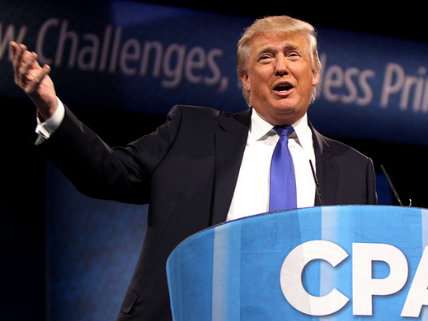GOP Leaders Want to Unify Around Trump. That Will Only Make the Republican Party's Problems Worse
Rallying behind Trump would cement the party's status as a joke party devoted to channeling grievances.

Donald Trump, the presumptive Republican presidential nominee, and Speaker of the House Paul Ryan have been in a sort of low-level standoff for the last week, following Ryan's announcement that he could not yet support the nominee, with Trump firing back that he was not yet ready to support Ryan's policy agenda. The two met today on Capitol Hill, but the meeting didn't exactly produce a breakthrough.
At the end of the session, the pair released a joint statement that looks to have been workshopped to please both camps—making Ryan's case that "it's critical that Republicans unite around our shared principles, advance a conservative agenda" while repeating Trump's frequent point that both men "are extremely proud of the fact that many millions of new voters have entered the primary system, far more than ever before in the Republican Party's history."
The pair said that they planned further discussions, but that the first meeting "was a very positive step toward unification." Reince Preibus, the chair of the Republican National Committee, seconded that notion, tweeting that the meeting was "a very positive step toward party unity." Rep. Cathy McMorris Rodgers, the House GOP's highest ranking woman and a critic of Trump's, also called the meeting an "important first step" towards unity.
Unity seems to be the buzzword for Republicans talking about Trump these days, with Ryan explaining his initial decision to not back Trump by saying that the presumptive nominee had not yet unified the party.
You can understand the incentives for party leaders to call for unity, but unity isn't the solution to the party's Trump problem. On the contrary, to unify around Trump would only exacerbate that specific problem, as well as the deeper party dysfunctions that led to him in the first place.
Trump is, among other things, a product of the party's broad unwillingness to engage in productive self-criticism with regards to either its policies or its tone and approach to politics, to hold a sustained debate about party identity and priorities. Yes, scattered efforts have been made, but on the whole the GOP has remained largely committed to not challenging its own status quo.
At the same time, the GOP has been far too willing to accommodate, and in many cases encourage, demagogues and entertainers who, like Trump, have little interest in the details of policy or the compromises that effective political movements require.
The GOP has allowed itself to become a party devoted to channeling cultural outrage and racial resentment rather than around one designed to organize a political coalition for effective governance. Indeed, it has shed most of its interest in the business of governance in favor of a politics built entirely on grievance.
That has played well with a certain portion of the GOP base, but it has helped contribute to the party's dwindling appeal at the national level, while making meaningful policy reforms essentially impossible, because it does not allow for productive negotiation. Grievance is not an agenda towards which a party can work and make progress, especially when the chief goal is to keep that grievance alive.
This is why Trump's approach to policy has been so maddeningly shallow: To the extent that he has offered policies, the particulars are largely beside the point; that they do not make sense, do not add up, change constantly, cannot possibly be implemented, and are often illegal does not matter. They are designed primarily to energize the grievances of his supporters, and to channel those grievances into additional support for Trump.
Trump is merely the most prominent and successful example of this brand of GOP politics, which goes back years—to the party's flirtations with fringe presidential candidates like Michelle Bachman and Herman Cain, to its nomination of not-so-sharp Senate candidates like Sharron Angle and Christine O'Donnell, to its willingness to back a presidential ticket that included Sarah Palin.
Not all of the party's candidates and politicians have been quite so self-evidently ridiculous. But their presence has been strong enough to color the party's character. The party of joke candidates has, unsurprisingly, become a joke. And now it has nominated a joke for president.
For the party's leaders and influencers to unify around Trump would be to embrace the party's reputation as a joke party, devoted largely to channeling grievance, rather than to fight it. It would be to repeat the mistakes that led to Trump in the first place, and further the long-term fracturing of the party in the name of short-term harmony. If Paul Ryan and other party leaders genuinely wish to avoid that—and maybe the real issue is that they don't—then what's called for is some disunity.
